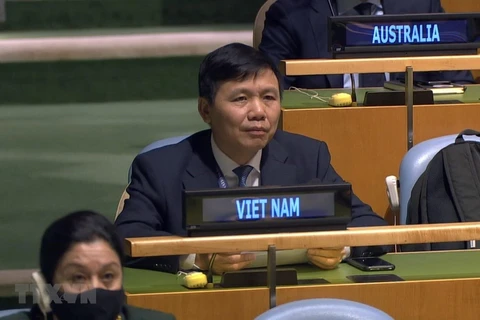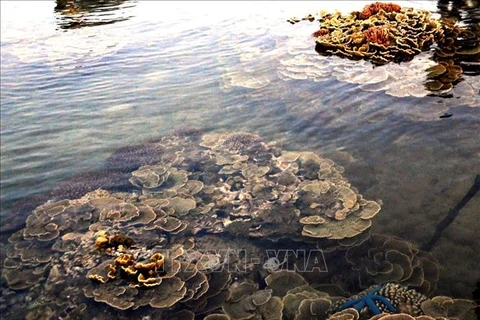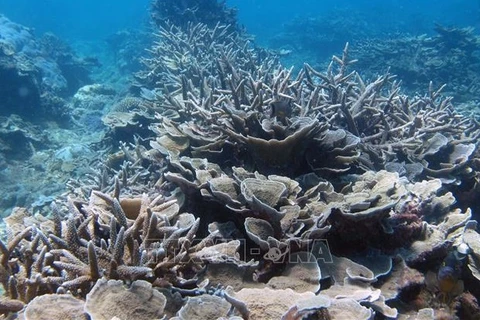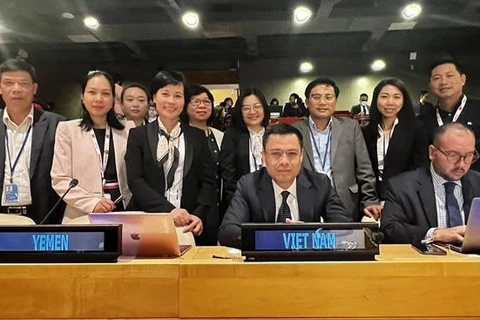 Vietnamese Minister of Foreign Affairs Bui Thanh Son signs the United Nations agreement on the conservation and sustainable use of marine biological diversity of areas beyond national jurisdiction (the High Seas Treaty)(Photo: VNA)
Vietnamese Minister of Foreign Affairs Bui Thanh Son signs the United Nations agreement on the conservation and sustainable use of marine biological diversity of areas beyond national jurisdiction (the High Seas Treaty)(Photo: VNA) The signing of the agreement conveyed the message that Vietnam is a positive and responsible member of the international community as well as the country’s efforts to join hands with countries to deal with global issues, contributing to peace, prosperity and sustainable development.
More than 60 countries are scheduled to sign the agreement during the underway high-level week of the 78th UN General Assembly.
The ratification and signing of the deal is a historical milestone in the international community’s efforts in environmental protection during the implementation of the 2030 Agenda, especially the goal No.14 on preservation and sustainable use of oceans and maritime resources.
This is the third agreement negotiated and signed within the framework of the 1982 UNCLOS, reaffirming the role and importance of the convention as a legal framework for all activities at sea and in oceans.
The High Sea Treaty regulates the exploitation, sharing of benefits and conservation of marine genetic resources in international waters. This is a new potential resource, belonging to large sea areas accounting for more than 60% of the surface area of the oceans that do not belong to any country. Many areas at the bottom of the oceans have exceptionally rich ecosystems, with many rare and precious genes of high value for scientific research and great economic potential, especially in pharmaceutical and cosmetic production.
Currently, only developed countries and private companies possessing leading marine technologies and biotechnologies, with abundant financial resources, are capable of collecting marine genetic resources and developing applications that bring profits, while there is no international document regulating the obligation to share benefits and conserve these resources.
Talking to the Vietnam News Agency (VNA)'s resident correspondents in New York, Son said the signing of the treaty is an important milestone, as this is one of international treaties that draw the greatest attention in the past decade.
 Minister of Foreign Affairs Bui Thanh Son speaks to Vietnam News Agency's correspondent in New York following the signing of the High Seas Treaty (Photo: VNA)
Minister of Foreign Affairs Bui Thanh Son speaks to Vietnam News Agency's correspondent in New York following the signing of the High Seas Treaty (Photo: VNA) At the same time, in recent years, the international community's awareness and concern for ocean issues and maritime law is increasing, especially in the context of depletion of marine resources due to overexploitation and negative impacts of environmental pollution and climate change, he noted.
The signing of the agreement is the result of long-term efforts by the international community, a nearly two-decade process with official negotiations beginning in 2018 with the participation of almost all UN member countries, including landlocked nations or non-signatories of the UNCLOS. The minister said that the approval of the treaty by consensus last June, and the fact that a large number of participating countries signed it right on the opening day demonstrated the success of the negotiation process, describing it as a historic milestone in efforts of the international community to protect the marine environment.
The agreement has opened up opportunities for developing countries to access, participate in research and benefit from genetic resources in international waters, while reaffirming the role and importance of the 1982 UNCLOS as a legal framework for all activities on the seas and oceans.
As a coastal country with high awareness of the importance of oceans to the national construction and defence, Vietnam has joined the negotiations on the agreement right from the beginning.
For Vietnam, the agreement has many important meanings, stated the minister, underlining that the pact continues to strengthen the system of legal documents based on the 1982 UNCLOS in the management of seas and oceans towards the goal of sustainable development. It reaffirms the 1982 UNCLOS as the legal framework for all activities at sea. All maritime claims must not harm the common interests of the international community. The scope of international waters, where marine living resources belong to all humanity, must be determined through and in accordance with 1982 UNCLOS, he stressed.
The agreement opens up opportunities for Vietnam and other developing countries to participate in scientific research, transfer marine technologies, and receive economic benefits shared by other countries which have greater advantages in marine technology and strong financial science and technology to exploit genetic resources in the high seas.
The agreement also creates and encourages international cooperation mechanisms and regional marine cooperation with the goal of preserving and sharing benefits from marine genetic resources, which brings opportunities for Vietnam to promote cooperation, strengthen the intertwining of interests, and contribute to protecting the homeland early and from afar.
At the same time, Vietnam’s early joining of the agreement’s negotiations and contributions to the building of the agreement help the country realise its strategy on actively and responsibly participating in solving international and regional issues related to seas and oceans, as well as its policy of playing a core, leading, and mediating role at multilateral forums of strategic importance, which is stated in Directive 25 of the Party Central Committee’s Secretariat on enhancing the country’s multilateral diplomacy until 2030, Son said./.
VNA























